In this week’s review of Court Judgments, we look at the Supreme Court’s order that a Complaint filed before the expiry of 15 days period for a cheque bounce case is not maintainable, that the review power of courts cannot be used for errors detected by reasoning, that High Court must give the accused opportunity to defend themselves, and that Section 304B IPC has been incorporated to deal with dowry deaths to send a strong message to society.
SC: Complaint filed before the expiry of 15 days period for cheque bounce case is not maintainable
In Gajanand Burange vs. Laxmi Chand Goyal before the Supreme Court, the respondent had addressed a notice to the appellant alleging that the appellant had taken a cash loan of Rs. 2.5 lakhs and furnished a cheque dated 28 October 2005 towards repayment. It was mentioned that the bank had returned the cheque to the respondent due to inadequate funds in the appellant’s account. The appellant received the notice on 08 November 2005, and the respondent filed a complaint against the appellant on 22 November 2005, before the period of fifteen days was complete.
In the Trial court, the appellant was acquitted while the High Court allowed the appeal filed by the respondent and convicted the appellant. The issues before the Supreme Court were-
- Can cognizance of an offence punishable under Section 138 of the Negotiable Instruments Act, 1881 (NI Act) be taken on the basis of a complaint filed before the expiry of the period of 15 days stipulated in the notice required to be served upon the drawer of the cheque in terms of Section 138(c) of the NI act?
- If not, can the complainant be permitted to present the complaint again notwithstanding the fact that the period of one month stipulated under Section 142(b) for the filing of such a complaint has expired?
The bench comprising Justices DY Chandrachud and AS Bopanna noticed that both these issues were answered by a three judges’ bench Yogendra Pratap Singh vs. Savitri Pandey and Another. Referring to this case, the bench noted that while the notice was received by the appellant on 08 November 2005, the complaint was filed before the period of fifteen days was complete. The complaint could have been filed only after 23 November 2005, in line with Section 142 of the NI Act. The Supreme Court allowed the appeal and held that the complaint was not maintainable before the expiry of the period of fifteen days from the date of its receipt by the appellant. Further, the Court directed the respondent to institute a fresh complaint within two months and asked the trial court to complete the trial within a period of six months.
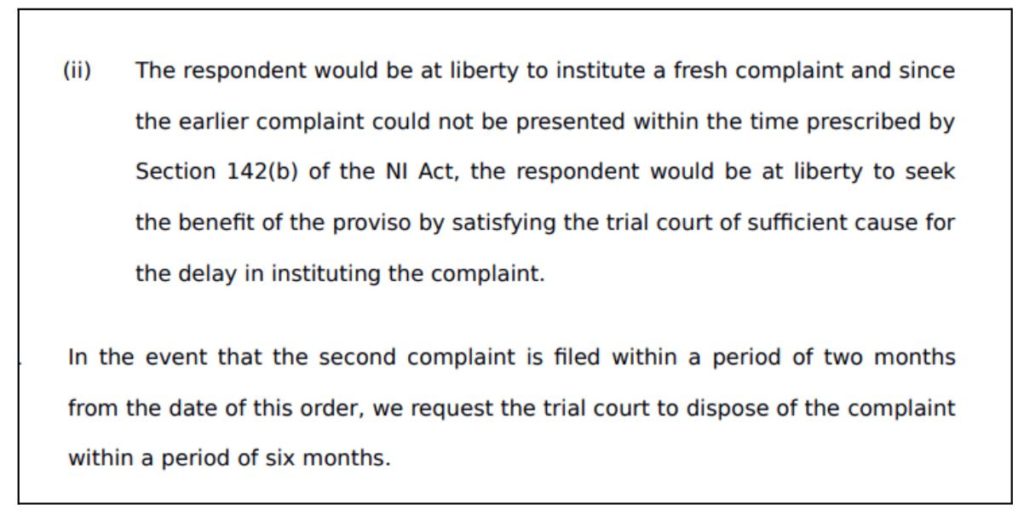
SC: Review power cannot be used for errors detected by reasoning
S. Madhusudhan Reddy vs. V. Narayana Reddy involved appeals and successive review petitions pertaining to the protection of tenancy rights in Mahbubnagar, Telangana, since 1967. In the Supreme Court, the contentions raised on behalf of the appellants were that the review petitions filed by the respondents were not maintainable as they do not satisfy any of the conditions for review provided in Order XLVII Rule 1 of the Civil Procedure Code, 1908. The appellants who were the legal heir of the original tenants also argued that the High Court shouldn’t have entertained successive review petitions filed by the respondents as there were no new facts being established or errors found.
Referring to legal provisions, the Supreme Court Bench of CJI NV Ramana, Justices Krishna Murari and Hima Kohli noted that a review application would be maintainable on (i) discovery of new and important matters or evidence that, after exercise of due diligence, were not within the knowledge of the applicant or could not be produced by him when the decree was passed or the order made; (ii) on account of some mistake or error apparent on the face of the record; or (iii) for any other sufficient reason.
The Bench also referred to past judgements and noted that appeal and the Court’s jurisdiction of the review were different. A judgement may be opened for review if there is an apparent error. However, if an error is identified through reasoning, then it is not an error apparent on the face of the record. Further, it added that a mistake can be corrected by the Court, but the view cannot be changed just because a matter may be viewed in different ways. An erroneous decision and error apparent on the face of the record can be clearly distinguished and the Superior Court can rectify the erroneous decision. The error apparent requires review jurisdiction.
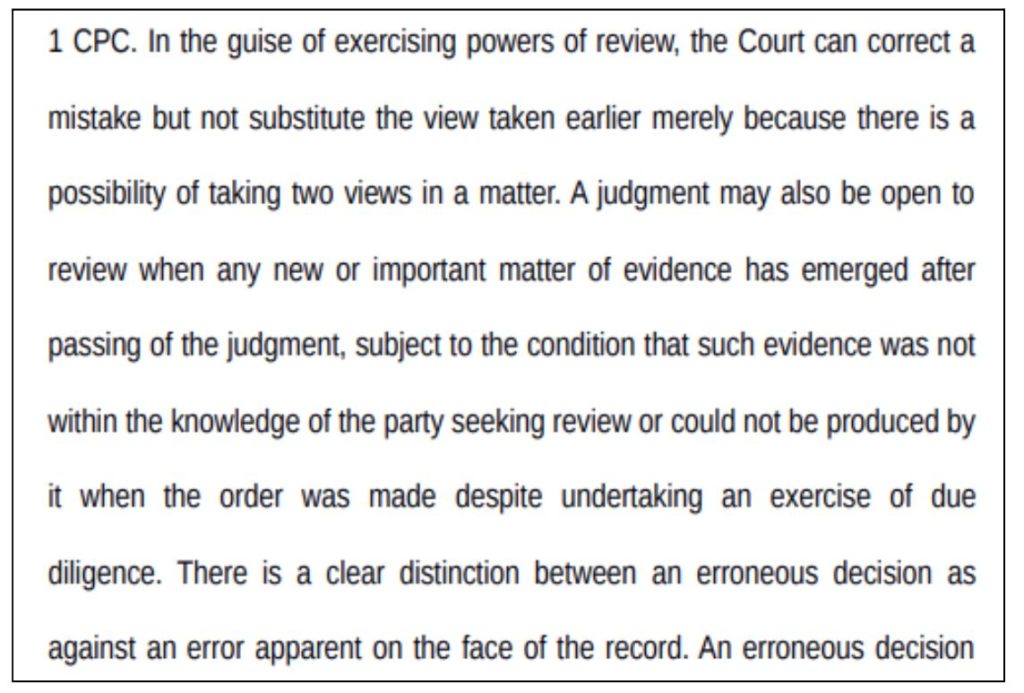
In this case, the Court, allowing the appeal, stated that the second set of review petitions was an abuse of the process of the court which should have been rejected by the High Court.
SC: Criteria for appointment on compassionate grounds must be strictly adhered to
In the case of Central Bank of India vs. Nitin, the respondent’s application for compassionate appointment was rejected by the Central Bank of India on grounds that the family of the retired employee had more than 60% of the last drawn gross salary as income. The respondent then filed a writ petition which was allowed by the Bombay High Court that directed the bank to consider the respondent’s case as per his seniority in filing the application.
The Bank then approached the Apex Court which observed that the High Court had ignored the financial criteria for compassionate appointment under the Compassionate Appointment Scheme. The Supreme Court Bench of Justices Indira Banerjee and V. Ramasubramanian also observed that the respondent had suppressed his appointment with another bank in the application which was enough reason to reject his application. Allowing the appeal, the Bench added that the claim for compassionate appointment is traceable only to the Scheme framed by the employer for such employment.
Noting that the appointment on compassionate grounds was to enable dependent family members to deal with the death or retirement of the employee, it was to be done adhering to the prevalent rules. In this case, a financial criterion has been given which has to be considered for the appointment. If the criteria are not adhered to, then the quota may be filled up excluding others who might be in acute financial distress.
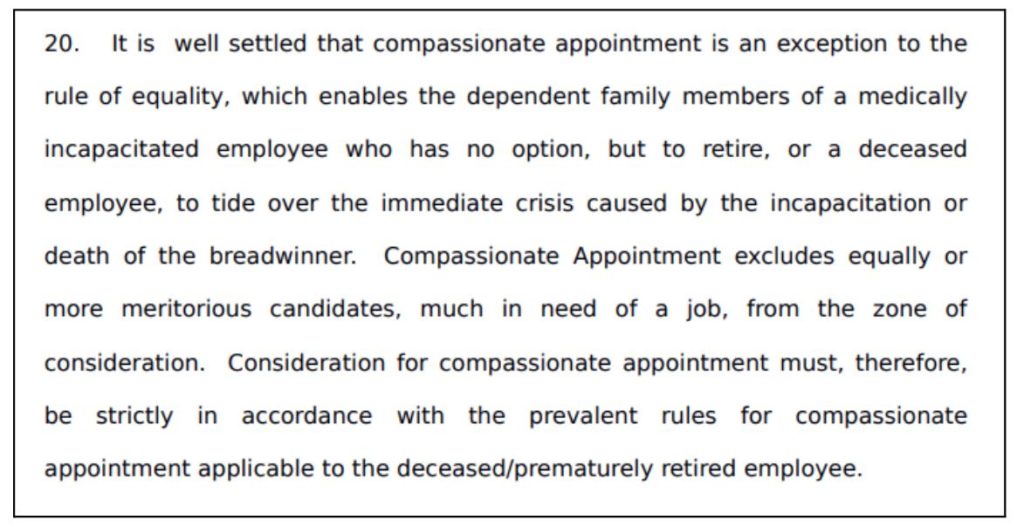
SC: High Court must give the accused opportunity to defend themselves
In Radheyshyam and Anr. vs. State of Rajasthan, the accused persons were convicted by the Trial Court for offence punishable under Section 302 of the Indian Penal Code and sentenced to life imprisonment. When they appealed in the Rajasthan High Court, it was noted that the offence fell under the ‘rarest of rare’ category and the life imprisonment was extended to rest of their lives. The High Court also observed that the trial court had failed to consider that the case fell in the ‘rarest of rare’. The appeal was filed in the Apex Court by the accused challenging the trial court’s order and the fact that the accused were not provided an opportunity to defend themselves.
The Supreme Court Bench of Justices B.R. Gavai and P.S. Narasimha opined that the High Court could have itself exercised suo moto powers and enhanced the sentence. However, prior to doing so, the High Court was required to give notice to the appellants. However, in this case, the High Court failed to give the appellants an opportunity to defend themselves before extending the imprisonment tenure. Stating this, the Supreme Court Bench allowed the appeal partially quash the imprisonment enhancement.
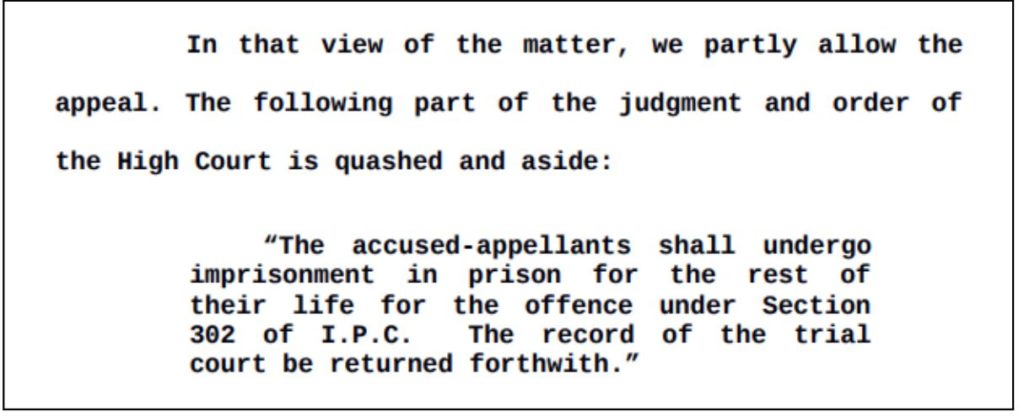
SC: Section 304B IPC has been incorporated to deal with dowry deaths to send a strong message to society
In Ajhola Devi & Anr. vs. State of Jharkhand the father-in-law and mother-in-law of the deceased were convicted by a trial court and High court under Section 304B read with section 201 of the Indian Penal Code for dowry death. They were sentenced to rigorous imprisonment for 10 years. The appellants approached the Supreme Court seeking lesser punishment considering their age.
However, the Supreme Court Bench of Justices M. R. Shah and B. V. Nagarathna upheld the decisions of the trial court and High Court. The Court noted that the accused had come with the false theory that the deceased had died due to diarrhoea within one year of marriage while the demand of dowry was established and proven by the prosecution. The bench also observed that 304B was incorporated to strongly deal with dowry deaths so that strong messages are sent to society. It also added that it found no reasons to interfere with the decisions of the High Court and trial court.
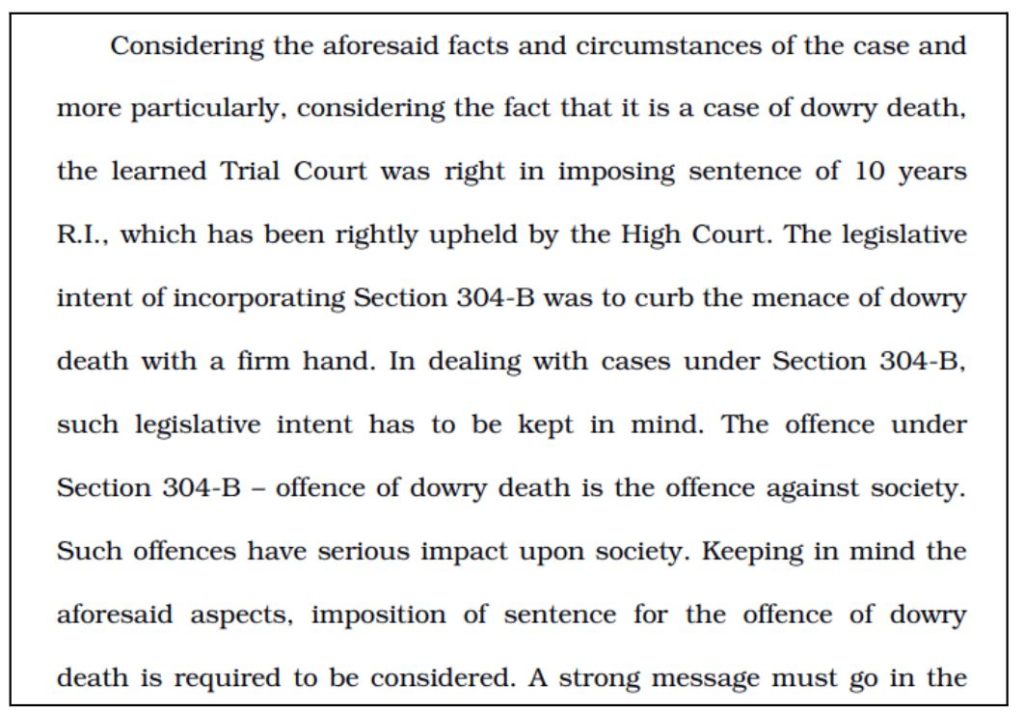
Featured Image: Review of Court Judgments


